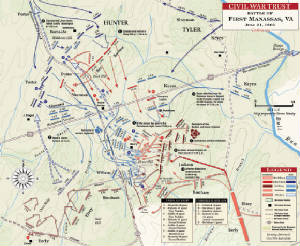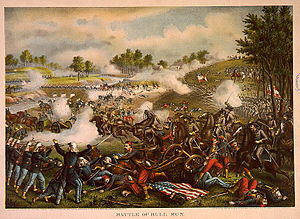|
General M. L. Bonham 1st Battle of Manassas / First Battle of Bull Run
General M. L. Bonham's Official Report for the Battle of First Manassas / Bull Run
| First Battle of Manassas Civil War Battlefield Map |

|
| 1st Battle of Manassas Map |
HDQRS. FIRST BRIG. FIRST CORPS, ARMY OF THE POTOMAC,
Camp Gregg, August 1, 1861.
Brig. Gen. G. T. BEAUREGARD,
Commanding First Corps, Army Potomac.
GENERAL: I had ordered reports from my officers of the operations of the 21st of July previous to the 1st instant, though
I had not until that day received instructions to do so. Between the 18th and 21st of July I placed on my extreme left Kershaw's
regiment with Kemper's battery, both to give support to the left or center of your whole line, as circumstances might require,
and to keep watch on the enemy's movements, should he attempt to cross any part of his force by Cub Run Ford, between Colonel
Cocke's position at stone bridge and my own at Bull Run. Colonel Kirkland's regiment was placed in my center, on the ground
previously occupied by Colonel Kershaw. The enemy continued up to evening of the 20th to make some display of force in my
front, but to what extent it was impossible to ascertain, as his force was under cover of the hills and woods. My command
was kept on the alert, and my scouts and pickets kept careful watch on his movements, under the expectation that he was preparing
to move directly on my position.
About 2.30 o'clock on the morning of the 21st Colonel Kirkland, field officer of the day for my command, a vigilant officer,
came in from visiting his pickets beyond the run and informed me that he had heard the rumbling to my left front of artillery
Wagons. I directed him to renew his efforts to ascertain its character, and before daylight he confirmed his suspicions that
it was the enemy in force, which I communicated to headquarters. I also sent across the run General McGowan, one of my volunteer
aides, who brought me the same intelligence. I directed him to report to you in person, and crossing myself (it was now light)
to the grove near Butler's house, directly in my front, I perceived by my field-glass, dimly in the distance, the enemy in
large force proceeding along the Warrenton turnpike towards the stone bridge, Colonel Cocke's position. This fact I immediately
communicated to headquarters, and directed my whole command to prepare for action, as I supposed the assault would be made
early along our whole line.
Early in the morning the enemy's fire was opened upon my position from the batteries in my front, throwing shot and shell
from rifled cannon, and kept up until the afternoon, with occasional exchanges of small-arms between the advance troops. The
distance was such that my own field pieces could do but little execution, and my fire was reserved for a closer encounter.
My men occupied through the day the trenches under this pretty regular fire of shell and shot, exhibiting a coolness and steadiness
worthy of veterans.
While standing a little after noon with General Johnston and yourself on Lookout Hill, in rear of my position, watching the
progress of the engagement on my left, where the enemy's chief force seemed to be concentrating, I received an order from
yourself in person to detach to the support of our troops engaged on the left, two of my regiments, with one battery. I immediately
sent forward Kershaw and Gash with Kemper's battery.
Between 5 and 6 o'clock in the afternoon I received an order from General Johnston to move forward upon Centreville with most
of my command and General Longstreet's which order was at once obeyed. Before we had reached the position which the enemy
had occupied in our front he abandoned his camp, with indications of a precipitate retreat. I continued the pursuit to near
Centreville, when the enemy opened with his artillery upon the route of my column as indicated by the dust. Colonel Lay, with
a small escort, having gone forward to make a reconnaissance, found his artillery and infantry drawn up on the hills between
the run and Centreville, covering the approach to that place. I ordered my own infantry to deploy in the woods to the left
of the road and General Longstreet's to the right placing a battery of artillery in the road, and the cavalry in the rear,
under cover.
By the
time the deployment was completed it was dark. After the lapse of a half hour or more I moved the whole command to the run,
to refresh themselves preparatory to executing such order as I might receive from you, reporting the fact to yourself at Manassas. During the night the enemy abandoned his position at Centreville.
On the following morning I received an order to move forward with two regiments, some artillery and cavalry, to Centreville,
where my command, during an incessant fall of rain, took possession of and collected together as far as practicable a large
quantity of commissary supplies, tents, wagons, horses, with one piece of artillery, four caissons, and a large quantity of
ammunition, and a number of prisoners, sending to Manassas all that could be forwarded that evening. The following day I was
ordered to occupy Vienna.
I shall find it difficult to do justice to the fortitude,
the patriotism, and the steady courage of the officers and men composing my command, through their hard labors of several
weeks in the trenches at Fairfax Court-House; the falling back from that place to Bull Run, and their occupation of the trenches
for four successive days through all changes of weather, much of the time without food, and entirely without covering, their
readiness to meet the foe at any odds at Fairfax, and the willingness to encounter him at all times at Bull Run, command my
highest admiration. To those gentlemen who belonged to my staff in South Carolina as the major-general of the South Carolina
State troops, and who so promptly responded to the first call from the State of Virginia for assistance, at all times cheerfully
rendering me every aid in their power in the organization of the troops which have been at different times under my command,
coming with me to Manassas at the beginning of military operations in this quarter, and sustaining me under every trial and
difficulty, I am much indebted. Col. W. C. Moragné, Maj. S. W. Nelson, and Maj. B. H. Whitner, of my regular staff, and Maj.
E. Spann Hammond, of my volunteer staff, were called home by imperative duties previous to these operations. To Lieut. Col.
W. D. Simpson, Lieut. Col. A. P. Aldrich, and Lieut. Col. James M. Lipscomb, of my regular staff, am I greatly indebted for
most active and efficient services during the whole time of the operations of my command from the 17th to the 22d of July,
inclusive, each executing every order delivered him with the utmost alacrity, and frequently under circumstances of peril.
I am also indebted to Maj. Thomas J. Davies, of my regular staff', and Maj. S. W. Melton, and Alfred Moss (the latter of Virginia), my volunteer aides, for similar active and efficient services;
and to Major Melton I am further indebted for very valuable aid as military secretary. I am also much indebted to my volunteer
aides, Majs. S. S. Tompkins, W. P. Butler; and M. B. Lipscomb, for valuable assistance in the performance of various duties
connected with my command from the time they joined me at Centreville to the close of the operations. To General S. McGowan,
volunteer aide, who also joined me at Centreville, I am under many obligations for his valuable assistance during the operations
of my command from the 17th to the 21st, inclusive, under circumstances of peril and exposure.
I desire to mention in most favorable terms the valuable
services of Col. George W. Lay, Virginia forces, who acted
as my adjutant-general during the above-mentioned operations. To Capt. W. H. Stevens, of the Engineers, C. S. Army, am I greatly
indebted for his indefatigable labors in putting Fairfax Court-House in a state of defense, and his constant attention to
the execution of all Orders extended through him, both in camp and in the field. It is also proper to mention the valuable
aid rendered Captain Stevens by General Johnson Hagood, of South Carolina; Professor Venable, of South Carolina College; and
Mr. Nyllis, of the Eighth Regiment South Carolina Volunteers, as volunteer assistant engineer in the construction of the works
at Fairfax Court-House. Of Captains Wickham, Ball, Powell, and Payne, and the officers and men of their commands, who have
been with me from about the time of my arrival at Manassas early in May, I wish to make my acknowledgments for valuable and
efficient services, at all times cheerfully rendered. I desire to make favorable mention also of Colonel Radford and his cavalry,
who joined me at a late period, and who have ever promptly executed all my orders. Captain Kemper and the officers and men
of his battery are deserving of my highest approbation. They were the first artillery to occupy Artillery Hill at Centreville
under my orders. They have been kept steadily in the front, and have shown themselves worthy of the position and the great
cause in which they are engaged. The distinguished parts performed by Colonels Kershaw and Cash and Captain Kemper, as also
by Colonel Radford's cavalry and the other troops of cavalry belonging to my command, was somewhat under your own observation
on the 21st of July, and to their reports I respectfully refer. Col. J. L. Kemper, of the Seventh Regiment Virginia Volunteers,
is entitled to my highest approbation, not only for his generous acceptance of the place of quartermaster with my advanced
command, but also on account of his activity and efficiency as a member of my staff in carrying my orders on the 17th, as
well as the 18th, at Bull Run. To Colonels Williams, Bacon, Kirkland,
and Kelly, and Captain Shields, and the officers and men of their commands, I am also indebted for the promptness, cheerfulness,
and energy with which they performed all the duties assigned to them; and I commend the entire command for the spirit and
patriotism with which they performed all their duties. To Major Kennedy, commissary of my command, and Lieutenant Washington, assistant quartermaster, C. S. Army, am I also indebted
for active and efficient services.
For more minute details of the operations of the different corps I respectfully refer to the reports of the commanders of
those corps.
I am, very respectfully, your obedient servant,
M. L. BONHAM,
Brig. Gen., Comdg. First Brigade, First Corps, Army Potomac.
| Battle of Manassas Painting |

|
| Battle of Bull Run Painting |
|

